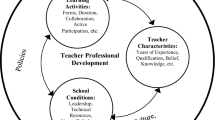Abstract
Structured group interviews with Thai and Indonesian educators indicate that expatriate experts require a wide range of personal and professional qualities to be effective: they must have expertise, be able to establish and maintain good relationships with people, be well organised and effective teachers, and transfer information and skills that are applicable and of benefit to the nation. None of these qualities is simple or uni-dimensional. The study shows, for example, that ‘expertise’ has several elements including technical expertise, cultural knowledge, language ability and expertise in education. Practical implications of the findings are in overseas project design, management and placement of personnel, professional development of experts, and in the design, implementation and evaluation of teaching and training.
Zusammenfassung
Strukturierte Gruppeninterviews mit thailändischen und indonesischen Erziehern zeigen, daß augebürgerte Experten weitreichende persönliche und berufliche Fähigkeiten benötigen, um wirksam arbeiten zu können: Sie müssen Fachwissen besitzen, gute Beziehungen zu Menschen knüpfen und aufrechterhalten, gut vorbereitete und effektive Lehrer sein und Informationen und Fähigkeiten vermitteln, die anwendbar und von Nutzen für die Nation sind. Keine dieser Qualitäten ist einfach oder einseitig. Die Studie zeigt zum Beispiel, daß Fachwissen mehrere Bereiche umfaßt, wie z.B. technisches Fachwissen, Kulturkenntnisse, Sprachfähigkeiten und Fachwissen auf dem Gebiet der Erziehung. Praktische Folgerungen aus diesen Feststellungen finden sich in Projektentwürfen in Übersee, Management und Personaleinsatz, beruflicher Entwicklung von Experten sowie Entwurf, Durchführung und Evaluierung von Lehren und Fortbildung.
Résumé
Des interviews structurées de groupes avec des éducateurs thaïs et indonésiens indiquent que les experts expatriés nécessitent une large gamme de qualités personnelles et professionnelles pour être efficaces: ils doivent être expérimentés, être capables d'établir et de maintenir de bonnes relations avec les gens, être des enseignants bien organisés et efficaces, ils doivent transmettre des informations et des compétences qui sont applicables et profitables à la nation. Aucune de ces qualités n'est simple ou unidimensionnelle. Cette étude montre, par exemple, que la “compétence” englobe plusieurs éléments, tels que la compétence technique, la connaissance culturelle, l'aptitude linguistique et la compétence pédagogique. Les résultats obtenus ont des implications pratiques dans la conception des projets d'outre mer, l'administration et le recrutement du personnel, le développment professionnel des experts, au niveau de la conception, de la mise en oeuvre et de l'évaluation de l'enseignement et de la formation.
Similar content being viewed by others
References
Alatas, S.H. 1975. Education and the Captive Mind. In: E.H. Medlin, ed.,Asian Seminar Proceedings, March, 1974. Adelaide: The University of Adelaide.
Andrews, J.H.M., Housego, I.E. and Thomas, D.C. 1986. Effective Programs of InService Training in Developing Countries: A Study of Expert Opinion. The University of British Columbia, Canada (Mimeo).
Australia's Overseas Aid Program 1990–91. (1988 Budget Related Paper No. 4), Canberra: Australian Government Publishing Service.
Bosquet, J. 1976. Experts Under Fire.Prospects 6(4): 59–602.
Cohen, A.M., Trent, J.W. and Rose, C. 1973. Evaluation of Teaching. In R.M. Travers, ed.,Second Handbook of Research on Teaching (1041–1057). Chicago: Rand-McNally.
Delbecq, A.L., Van de Ven, A.H. and Gustafson, D.H. 1975.Group Techniques for Program Planning. Glenview, Illinois: Scott Foresman.
Edwards, M. 1989. The Irrelevance of Development Studies.Third World Quarterly 11: 116–135.
Ely, D.P. 1989. The Diffusion of Educational Technology in Indonesia: A Multi-Faceted Approach.British Journal of Educational Technology 20(3): 183–190.
Hore, T. 1982.AUIDP — UNHAS Consultancy. Teaching Methodology, Report on Workshop, Sep–Oct 1982. Melbourne: Monash University.
Macbean, A.I. and Balasubramanyan, V.N. 1978.Meeting the Third World Challenge. Second Edition. London: Macmillan.
Marsh, H.W. 1987. Students' Evaluations of University Teaching: Research Findings, Methodological Issues, and Directions for Future Research.International Journal of Educational Research 11:253–388.
Newble, D. and Cannon, R. 1989.A Handbook for Teachers in Universities and Colleges: A Guide to Improving Teaching Methods. London: Kogan Page.
Noesjirwan, J. 1978. A Rule Based Analysis of Cultural Differences in Social Behaviour: Indonesia and Australia.International Journal of Psychology 13(4): 305–316.
van den Bor, W., ed. 1983.The Art of Beginning. Wageningen, The Netherlands: Centre for Agricultural Publishing and Documentation (Pudoc).
Verspoor, A.M. and Leno, J.L. 1986. Improving Teaching: A Key to Successful Educational Change. Lessons from World Bank Experience. Bali, Indonesia: Paper presented at the Annual IMTEC Seminar.
Wallace, E. and Wisher, S. 1983. Conducting Management Training Overseas. Connecticut: Educational Systems and Designs Inc. (Mimeo).
Rights and permissions
About this article
Cite this article
Cannon, R.A. Expatriate ‘experts’ in Indonesia and Thailand: Professional and personal qualities for effective teaching and consulting. Int Rev Educ 37, 453–472 (1991). https://doi.org/10.1007/BF00597621
Issue Date:
DOI: https://doi.org/10.1007/BF00597621




